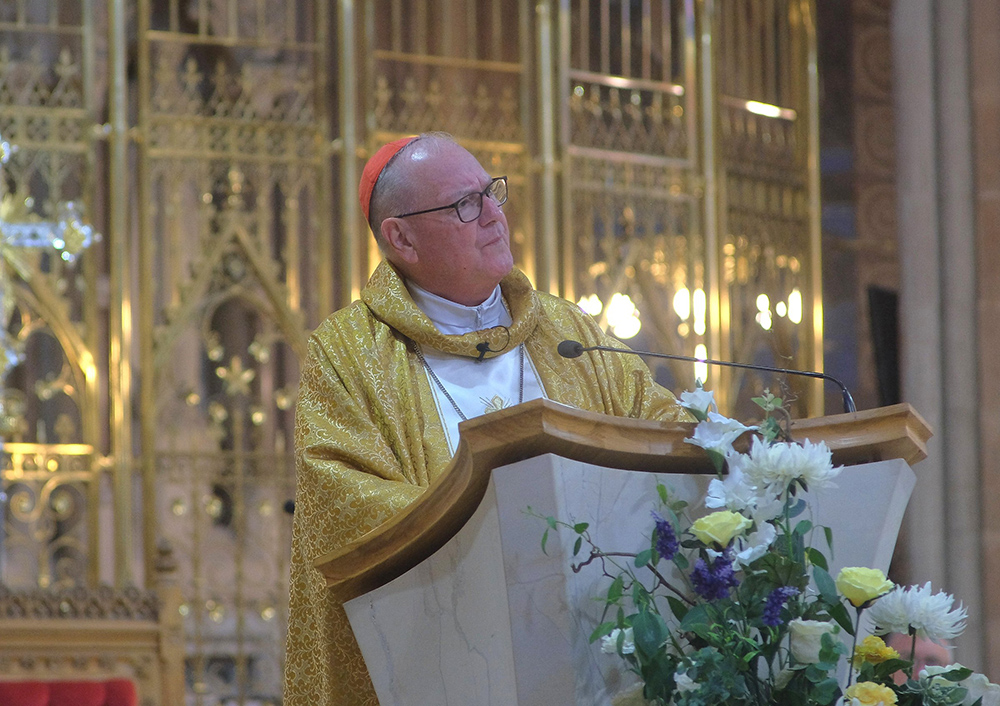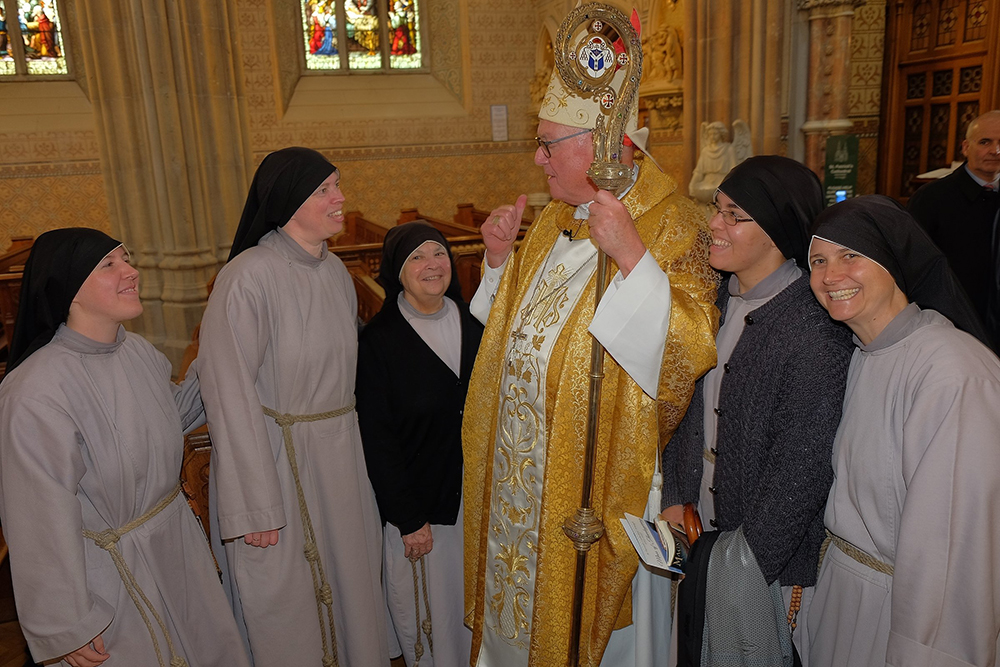
By Sarah Mac Donald
ARMAGH, Northern Ireland (OSV News) — The Archdiocese of Armagh’s celebration of the 150th anniversary of the opening of St. Patrick’s Cathedral culminated with Mass Aug. 27 celebrated by Cardinal Timothy M. Dolan of New York during which he paid tribute to the “cycle of evangelization” between Ireland and the United States.
The great-great-grandson of Irish emigrants, Cardinal Dolan told the packed cathedral that “wonderful” Sisters of Mercy from the Irish town of Drogheda had been part of his own education in Missouri and that he had sent a community of Franciscan Sisters of the Renewal to Drogheda and they are now based in the former Mercy convent in Drogheda.
Two members of the Sisters of Mercy attended the Mass as well as members of the Franciscan Sisters of the Renewal.
The primate of all Ireland, Archbishop Eamon Martin, recalled that “we know that among the most generous contributors to the building of this beautiful cathedral were the Irish in America,” including those who fled the Great Famine, which saw a million die of starvation and disease between 1845 and 1849, and another million emigrate in search of a better life.
Addressing the congregation, including Irish bishops, priests of Armagh and local civic and political representatives, Archbishop Martin recalled that Irish laborers, especially in New York, had contributed a shilling a month to the building of St. Patrick’s Cathedral in Armagh. The foundation stone was laid on St. Patrick’s Day 1840 but the project had to be suspended during the famine, and the money was used instead to aid the starving. Construction recommenced in 1853.
“We are very grateful to you for coming here so that we can say thanks to the people of America. There were many other generous benefactors from Toronto, Canada, Australia and England. People from all over the world, who knew it was very significant to have a Catholic cathedral once more in the city of St. Patrick,” Archbishop Martin said.
Speaking after Mass, Cardinal Dolan told the media that “even the famine couldn’t stop” the building of St. Patrick’s. “The example of a place like this makes us dig in and say let’s do it. Our ancestors did it, we can.”
He also paid tribute to the laborers of New York, who contributed to St. Patrick’s in Armagh as well as to the building of St. Patrick’s Cathedral on Fifth Avenue in Manhattan, which opened in 1879.
He recalled that Archbishop John Hughes, an Irishman, who oversaw the building of New York’s cathedral had said the cathedral would “be built by the pennies of the poor people.”
“We always have a church of the poor, that’s what Jesus wanted. And they like to see beautiful things for God, and they like to see beautiful places where they are welcome and feel at home. That happened here (Armagh) and that happened on Fifth Avenue, and it’s still going on,” Cardinal Doland said.
Joseph Zwilling, director of communications at the Archdiocese of New York, told OSV News that St. Patrick’s in New York began in the late 1850s but the American Civil War intervened and stopped all work on the cathedral.

“It was started by Archbishop John Hughes, who was the fourth bishop and the first archbishop of New York, but it was really completed by Archbishop John McCloskey who was the second archbishop and first cardinal of New York and first cardinal in the United States.”
Zwilling explained that up to 40 pilgrims accompanied Cardinal Dolan on the pilgrimage to Ireland, which was called “From St. Patrick’s to St. Patrick’s.”
“It has really been an opportunity to renew our appreciation for the faith of the Irish people who had such an impact on the faith in the United States, particularly in New York,” Zwilling said. “It was the Irish immigrants who built St. Patrick’s Cathedral in New York so that’s why it was appropriate we had the rector of St. Patrick’s Cathedral in New York with us (Father Enrique Salvo), we had the priest who is the head of the trustees in St. Patrick’s Cathedral (Msgr. Denis Keane) and many other people who are close to the cathedral joined us on this trip.”
New York Auxiliary Bishop Edmund J. Whalen was part of the group.
The pilgrimage included the celebration of the Eucharist at a “Mass rock” in Killarney, County Kerry. Outdoor Mass rocks were used by priests and the faithful when the practice of the faith was banned in Ireland during penal times under British rule.
“I don’t know if anything is more meaningful than having Mass on a rock in the middle of the woods, hidden away, and recalling those brave Irish people who, because they were persecuted for their faith, at the threat of their lives, would sneak out into the woods when the priests would come, with sentinels watching for the British troops, and come to hold Mass and holy Communion here,” Cardinal Dolan said in a video shared on X Aug. 22.
The pilgrimage included time at the International Shrine of Eucharistic and Marian Devotion at Knock in County Mayo, where Our Lady of Knock appeared in August 1879.
In his homily there, Cardinal Dolan said the apparition had occurred at “an anxious time and a somber time” in Ireland and in the same year that St. Patrick’s Cathedral opened on Fifth Avenue in Manhattan.
He noted that the apparition had taken place at “a simple parish church” in the “nondescript little village of Knock.”
“I am unaware of any other apparition of the Blessed Mother that has taken place at a simple parish church. Remember, in the history of Ireland, they couldn’t have parishes until Catholic Emancipation in 1829. Our Blessed Mother, I think, was trying to heighten the importance of parishes in the life of believing Catholics,” he said.
